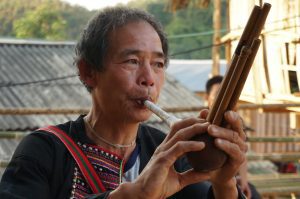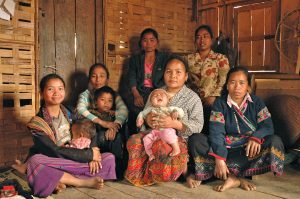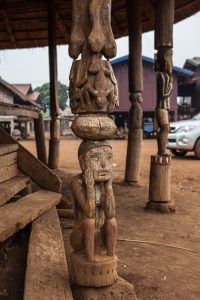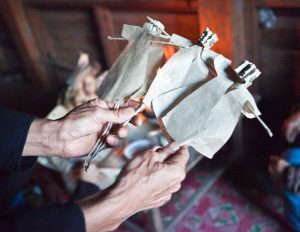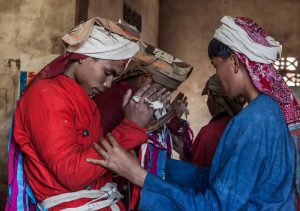No products in the cart.
Seeds of Culture: From Living Plants to Handicrafts
We were honoured to work with Dr. Yukino Ochiai, ethnobotanist and professor at Ryukoku University in Kyoto as the guest curator for this special exhibition exploring the importance of nature to culture. For over 15 years, Dr. Ochiai has focused her research on the grass plant Job’s tears (Coix), or mak dueay, amassing an unparalleled collection of objects featuring the plant’s seeds. This exhibition drew on Dr. Ochiai’s field research in Laos, Thailand, and Myanmar to show that the wild and domesticated plants of Job’s tears are used as food, medicine, and beads by ethnic groups belonging to different linguistic categories. In addition, this special exhibition provided insight into the clothing and changing lifestyles of the region’s ethnic minorities, including the Akha, Chin, Karen, Jinghpaw and Palaung. In particular, the seed beads have been used for costume decoration in beautiful and striking combinations. On display were unusual artefacts, including a Chin headdress that uses porcupine quills and magnificent necklaces from 14 different countries in Africa, Asia, and South America.
“By displaying the whole process from living plants, seeds and items in this exhibit, I hope to share an idea with TAEC visitors; how material culture is based on plant diversity and the environment,” Dr. Ochiai said.
Visitors were treated to a visually stunning experience allowing them to explore the meaningful role of the environment in daily lives of rural ethnic communities.
TAEC Co-Director Tara Gujadhur says, “In the past, ethnic groups gathered different kinds of natural materials from the forests and fields, including cotton, plant dyes, and the seeds of Job’s tears. Nowadays, these natural materials are being replaced by those from markets, such as machine-made textiles, chemical dyes, and synthetic fibres. This is just one indicator of the upheavals these communities are undergoing resettlement of villages, dependence on a market economy, and erosion of cultural practices and customs. We are looking forward to shedding more light on these issues through this exhibit.”
Read more about the Job’s tear seed bead in Textiles Asia Journal.
We gratefully acknowledge Professor William Klausner, EXO Foundation, and Saffron Coffee for their generous support of this exhibition on display September 2016 – September 2018.
Additional photographs of the exhibition can be found on Facebook.
We were honoured to work with Dr. Yukino Ochiai, ethnobotanist and professor at Ryukoku University in Kyoto as the guest curator for this special exhibition exploring the importance of nature to culture. For over 15 years, Dr. Ochiai has focused her research on the grass plant Job’s tears (Coix), or mak dueay, amassing an unparalleled […]

